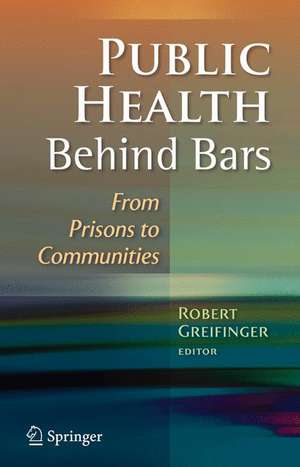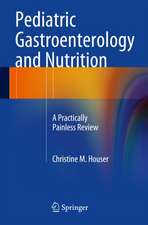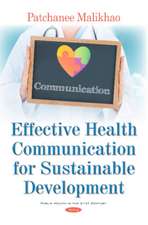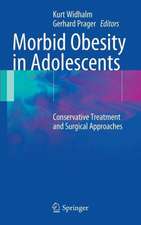Public Health Behind Bars: From Prisons to Communities
Editat de Robert Greifingeren Limba Engleză Hardback – 17 oct 2007
Chapter authors identify the most compelling health problems behind bars (including communicable disease, mental illness, addiction, and suicide), pinpoint systemic barriers to care, and explain how correctional medicine can shift from emergency or crisis care to primary care and prevention. In addition, strategies are outlined that link community health resources to correctional facilities so that prisoners can transition to the community without unnecessarily taxing public resources or falling through the cracks. Between the authors’ research findings and practical suggestions, readers will find realistic answers to these and similar questions:
- Can transmission of HIV, tuberculosis, and other communicable diseases be reduced and prevented among prisoners?
- How can correctional facilities treat addiction more effectively?
- What can be done to improve diagnosis and treatment of psychiatric disorders?
- Can correctional care benefit from quality management and performance measurement?
- How can care be coordinated between correctional and community health care providers?
- What are the health risks to communities if action is not taken?
Preț: 1123.13 lei
Preț vechi: 1182.25 lei
-5% Nou
Puncte Express: 1685
Preț estimativ în valută:
214.92€ • 229.81$ • 179.19£
214.92€ • 229.81$ • 179.19£
Carte tipărită la comandă
Livrare economică 17 aprilie-01 mai
Preluare comenzi: 021 569.72.76
Specificații
ISBN-13: 9780387716947
ISBN-10: 0387716947
Pagini: 576
Ilustrații: XVI, 576 p. 56 illus.
Dimensiuni: 178 x 254 x 30 mm
Greutate: 1.13 kg
Ediția:2007
Editura: Springer
Colecția Springer
Locul publicării:New York, NY, United States
ISBN-10: 0387716947
Pagini: 576
Ilustrații: XVI, 576 p. 56 illus.
Dimensiuni: 178 x 254 x 30 mm
Greutate: 1.13 kg
Ediția:2007
Editura: Springer
Colecția Springer
Locul publicării:New York, NY, United States
Public țintă
Professional/practitionerCuprins
Impact of Law and Public Policy on Correctional Populations.- Thirty Years Since Estelle v. Gamble: Looking Forward, Not Wayward.- Impact of Incarceration on Community Public Safety and Public Health.- Litigating for Better Medical Care.- Accommodating Disabilities in Jails and Prisons.- Growing Older: Challenges of Prison and Reentry for the Aging Population.- International Public Health and Corrections: Models of Care and Harm Minimization.- The Medicalization of Execution: Lethal Injection in the United States.- Communicable Disease.- HIV and Viral Hepatitis in Corrections: A Public Health Opportunity.- Prevention of Viral Hepatitis.- HIV Prevention: Behavioral Interventions in Correctional Settings.- Prevention and Control of Tuberculosis in Correctional Facilities.- Controlling Chlamydia, Gonorrhea, and Syphilis Through Targeted Screening and Treatment in Correctional Settings.- Primary and Secondary Prevention.- Health Promotion in Jails and Prisons: An Alternative Paradigm for Correctional Health Services.- Screening for Public Purpose: Promoting an Evidence-based Approach to Screening of Inmates to Improve Public Health.- Written Health Informational Needs for Reentry.- Reducing Inmate Suicides Through the Mortality Review Process.- Blinders to Comprehensive Psychiatric Diagnosis in the Correctional System.- Juvenile Corrections and Public Health Collaborations: Opportunities for Improved Health Outcomes.- Female Prisoners and the Case for Gender-Specific Treatment and Reentry Programs.- Building the Case for Oral Health Care for Prisoners: Presenting the Evidence and Calling for Justice.- Tertiary Prevention.- Treatment of Mental Illness in Correctional Settings.- Treatment and Reentry Approaches for Offenders with Co-occurring Disorders.- Pharmacological Treatment of Substance Abuse in Correctional Facilities: Prospects and Barriers to Expanding Access to Evidence-Based Therapy.- Thinking Forward to Reentry—Reducing Barriers and Building Community Linkages.- Health Research Behind Bars: A Brief Guide to Research in Jails and Prisons.- Reentry Experiences of Men with Health Problems.- Providing Transition and Outpatient Services to the Mentally Ill Released from Correctional Institutions.- Sexual Predators: Diversion, Civil Commitment, Community Reintegration, Challenges, and Opportunities.- Electronic Health Records Systems and Continuity of Care.- Community Health and Public Health Collaborations.- Improving the Care for HIV-Infected Prisoners: An Integrated Prison-Release Health Model.
Recenzii
From the reviews:
"A comprehensive, provocative volume of articles edited by Robert Greifinger that explores correctional health interventions and their impact on greater public health. … a multi-faceted, invaluable resource that should be required reading for anyone interested in correctional health. … This book is suitable for a wide audience and is an indispensable reference for correctional health students, professionals, and scholars; criminal justice experts; and particularly for new practitioners in the field of correctional health." (Amy Nunn and Ank Nijhawan, Journal of Urban Health, Vol. 85 (3), 2008)
"Public Health Behind Bars is a compilation of cross-disciplinary essays and reviews that illuminate the complexities of providing compassionate and competent medical care to inmates while maximizing public health. … is more than a public health or medical textbook and will be compelling to a broad audience. … The broad appeal of this book is greater because the contributors do not avoid controversial stances. … Overall, I was struck by the authors’ compassion for inmates throughout this book." (Ingrid A. Binswanger, New England Journal of Medicine, May, 2008)
"This edited book focuses on medical, legal, and public health issues in the American correctional system. … The book is intended for public policy practitioners, correctional administrators, correctional healthcare providers, inmate and patient advocates, lawyers, educators, students, public health practitioners, researchers, and community healthcare providers. … an excellent sourcebook for a graduate seminar in public health and corrections. … many opportunities for a professor to add thoughtful analysis, the book could easily be adopted in schools of public health or departments of criminal justice." (Paul J Goldstein, Doody’s Review Service, September, 2008)
"This collection of 30 chapters provides a comprehnsive examination ofthe interface between incarceration and public health. ... Greifinger has succeeded in bringing together a collection of essays that constitute a thorough examination of issues and programs generated by a court-prompted focus on the health of prison populations in the United States. Material from this book should be readily integrated into graduate programs in public health. Practitioners should find this text both insightful and pragmatic." (Keith J. Mueller, PhD, JAMA, November 5, 2008-Vol300, No. 17)
"A comprehensive, provocative volume of articles edited by Robert Greifinger that explores correctional health interventions and their impact on greater public health. … a multi-faceted, invaluable resource that should be required reading for anyone interested in correctional health. … This book is suitable for a wide audience and is an indispensable reference for correctional health students, professionals, and scholars; criminal justice experts; and particularly for new practitioners in the field of correctional health." (Amy Nunn and Ank Nijhawan, Journal of Urban Health, Vol. 85 (3), 2008)
"Public Health Behind Bars is a compilation of cross-disciplinary essays and reviews that illuminate the complexities of providing compassionate and competent medical care to inmates while maximizing public health. … is more than a public health or medical textbook and will be compelling to a broad audience. … The broad appeal of this book is greater because the contributors do not avoid controversial stances. … Overall, I was struck by the authors’ compassion for inmates throughout this book." (Ingrid A. Binswanger, New England Journal of Medicine, May, 2008)
"This edited book focuses on medical, legal, and public health issues in the American correctional system. … The book is intended for public policy practitioners, correctional administrators, correctional healthcare providers, inmate and patient advocates, lawyers, educators, students, public health practitioners, researchers, and community healthcare providers. … an excellent sourcebook for a graduate seminar in public health and corrections. … many opportunities for a professor to add thoughtful analysis, the book could easily be adopted in schools of public health or departments of criminal justice." (Paul J Goldstein, Doody’s Review Service, September, 2008)
"This collection of 30 chapters provides a comprehnsive examination ofthe interface between incarceration and public health. ... Greifinger has succeeded in bringing together a collection of essays that constitute a thorough examination of issues and programs generated by a court-prompted focus on the health of prison populations in the United States. Material from this book should be readily integrated into graduate programs in public health. Practitioners should find this text both insightful and pragmatic." (Keith J. Mueller, PhD, JAMA, November 5, 2008-Vol300, No. 17)
Notă biografică
Robert B. Greifinger, M.D., is a medical management consultant. He has extensive experience in the development and management of complex community and institutional health care programs. His current clients include managed care organizations and state and local correctional systems. Greifinger frequently serves as a court-appointed expert to report on ailing correctional health systems. He is also an adjunct Professor at the John Jay College of Criminal Justice. Previously, he was the Chief Medical Officer for the New York State of Correctional Services, which was responsible for the health care of 68,000 inmates.
Textul de pe ultima copertă
Projecting correctional facility-based health care into the community arena, Public Health Behind Bars: From Prisons to Communities examines the burden of illness in the growing prison population, and analyzes the considerable impact on public health as prisoners are released. More than forty practitioners, researchers, and scholars in correctional health, mental health, law, and public policy make a timely case for correctional health care that is humane for those incarcerated and beneficial to the communities they reenter. These authors offer affirmative recommendations toward that evolutionary step.
Chapter authors identify the most compelling health problems behind bars (including communicable disease, mental illness, addiction, and suicide), pinpoint systemic barriers to care, and explain how correctional medicine can shift from emergency or crisis care to primary care and prevention. In addition, strategies are outlined that link community health resources to correctional facilities so that prisoners can transition to the community without unnecessarily taxing public resources or falling through the cracks. Between the authors’ research findings and practical suggestions, readers will find realistic answers to these and similar questions:
Chapter authors identify the most compelling health problems behind bars (including communicable disease, mental illness, addiction, and suicide), pinpoint systemic barriers to care, and explain how correctional medicine can shift from emergency or crisis care to primary care and prevention. In addition, strategies are outlined that link community health resources to correctional facilities so that prisoners can transition to the community without unnecessarily taxing public resources or falling through the cracks. Between the authors’ research findings and practical suggestions, readers will find realistic answers to these and similar questions:
- Can transmission of HIV, tuberculosis, and other communicable diseases be reduced and prevented among prisoners?
- How can correctional facilities treat addiction more effectively?
- What can be done to improve diagnosis and treatment of psychiatric disorders?
- Can correctional care benefit from quality management and performance measurement?
- How can care be coordinated between correctional and community health care providers?
- What are the health risks to communities if action is not taken?
Caracteristici
Contributors drawn from public health, correctional health, civil rights law, and sociology Includes supplementary material: sn.pub/extras














